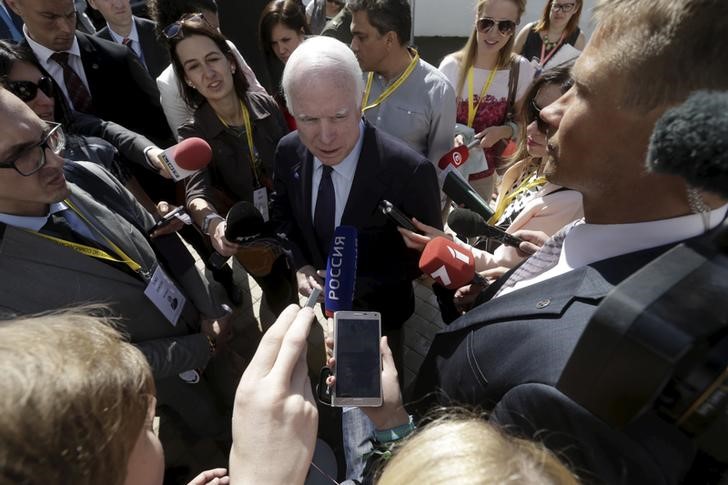By Andrea Shalal
WASHINGTON (Reuters) - The head of the U.S. Senate Armed Services Committee on Wednesday increased pressure on the Pentagon and the Air Force, demanding answers over the continued use of Russian rocket engines for U.S. satellite launches.
Senator John McCain, in a letter dated Feb. 10 seen by Reuters, asked Air Force Secretary Deborah James and Pentagon chief arms buyer Frank Kendall to explain why the U.S. government is continuing to deal with NPO Energomash, the Russian firm that builds Russian RD-180 rocket engines.
McCain pressed the officials on the legality of doing business with NPO Energomash given sanctions in place against Russian Deputy Prime Minister Dmitry Rogozin and others, who now have control over the company after a recent reorganization.
McCain also questioned the Air Force's continued payment of a large launch support contract to United Launch Alliance (ULA), a joint venture of Lockheed Martin Corp (N:LMT) and Boeing (N:BA) Co, despite the presence of a certified competitor, Space Exploration Technologies, or SpaceX.
McCain said he wants answers to these questions by February 22.
James pledged to respond to the questions during a January hearing, but McCain said he followed up in writing to underscore his concerns about what he has described as subsidies to Russian leader "Vladimir Putin and his gang of corrupt cronies."
Congress banned use of the Russian RD-180 rocket engines for military use after Russia annexed Ukraine's Crimea region in 2014. But U.S. lawmakers weakened the ban late last year, worried that it could drive ULA out of business and leave just privately-held SpaceX, to lift satellites into space.
James and other officials have urged Congress to allow use of the Russian engines that power ULA's Atlas 5 rocket for several years until alternatives are available in several years.
In his letter, McCain asked the U.S. and Air Force to explain what options they had to penalize ULA for not bidding in a recent launch competition despite receiving launch support of $800 million to $1 billion a year since 2006.
He also asked the department to examine what percentage of that annual support contract was associated with ULA's other family of rockets, the Delta 4, which the company plans to retire since it is more costly than the Atlas 5.

McCain and other senators argue that it would be worth the extra cost to end U.S. reliance on the Russian engines.